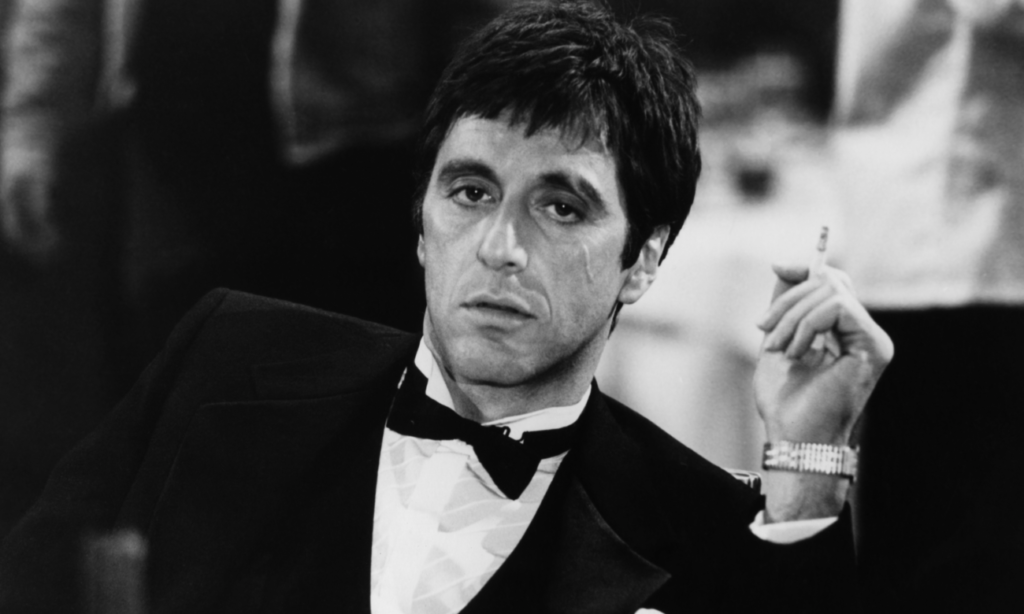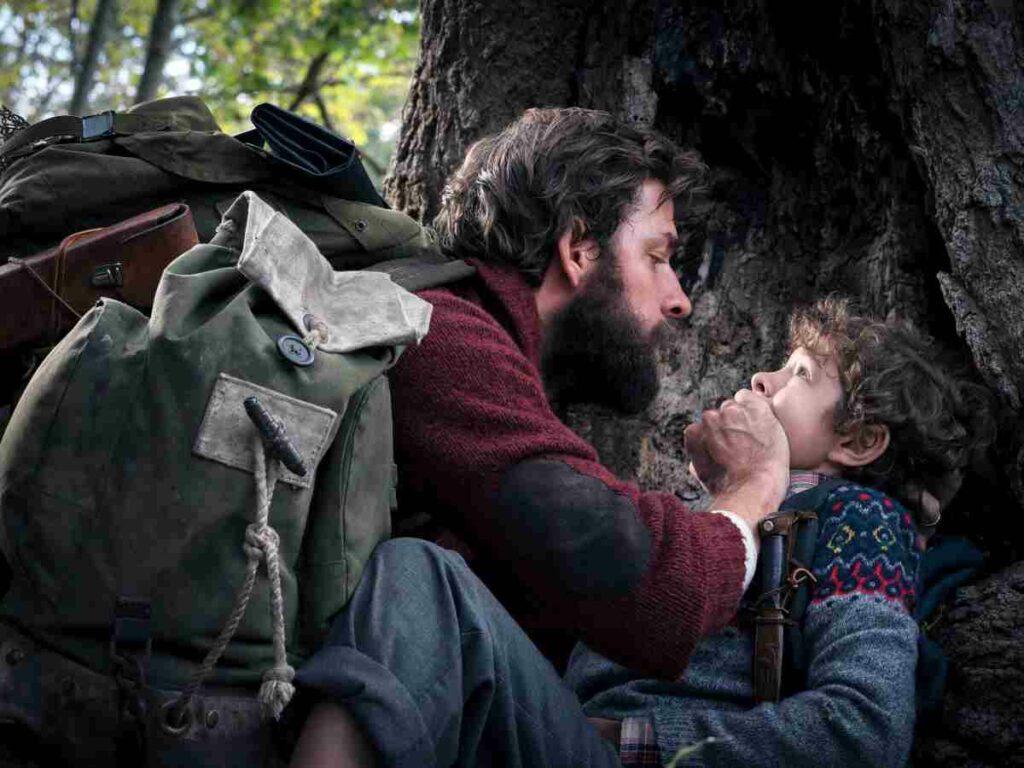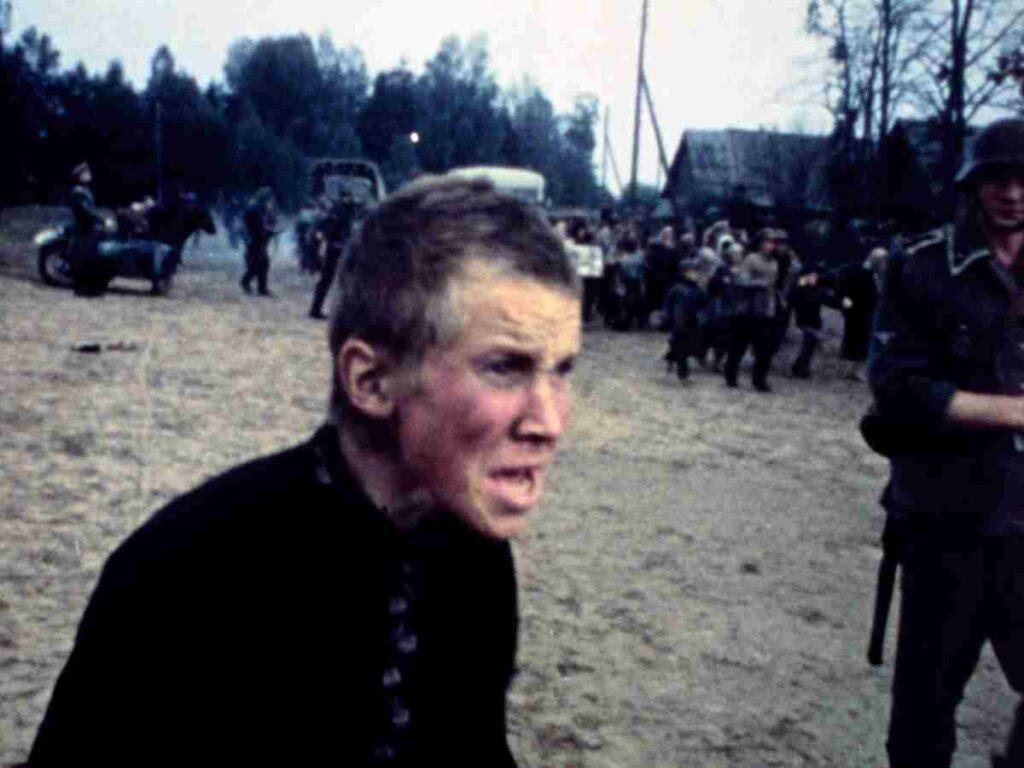In the Toast series today, we celebrate the legend who is many things – an Oscars darling, a Triple Crown of Acting winner, The Godfather of 1970s film realism, and both a New York City and True Crime film icon. Al Pacino.
We all know the classic lines. From The Godfather (1972): “I’ll make him an offer he can’t refuse.” Yes, Al Pacino was stinging, yet controlled. Utterly malevolently charismatic. There’s also ‘Dog Day Afternoon’ (1975): “Attica! Attica!” Frenzied. Sweaty. A summer revolution going down in The Big Apple’s Brooklyn borough. Or possibly the most famous line is from Scarface (1983): “Say hello to my little friend!” What thunderous sarcasm. This graciously kind, considerate greeting is followed by an epic 1980s cocaine-fueled shootout. Duck and cover! After Tony Montana came to town, Miami was never the same. Nor was that astonished 1980s movie-goer.
In the great Hollywood pantheon of one-liners, Al Pacino reigns supreme. There are simply too many to count. We can credit the novelist or screenwriter for writing them, and the director for creating the stellar ambiance in which to state them, but only Al Pacino could make them 100% memorable. Delivery. Al Pacino delivered, time and time again.
The result? His movies, characters, and one-liners have become part of our collective unconscious, our pop culture soul – reverberating with brilliant archetypes like the Mafia Boss, the Bank Robber, and in Scarface, that over-the-top 1980s Drug Lord. He made each of his characters iconic, legendary, and he imbued them with a radiant energy that positively leapt off the screen. For those not familiar with the amazing Al Pacino (if this is possible?), how could he be adequately described?
The Godfather
His breakout role was in 1972’s legendary The Godfather – in which he plays young, idealistic war hero Michael Corleone, who unfortunately takes a sharp U-turn to the dark-side with the Italian-American Mafia (organized crime syndicate). If using Roman Catholic religious references (and Roman Catholicism figures prominently in the film), one could say Michael transforms from angel to devil. Chilling.
Al Pacino was mesmerizing in this transformation. We simply couldn’t keep our eyes off of him! Aside from often being described as one of the best-looking actors to come out of the 1970s (adjectives like sizzling, hot, and ‘gorgeous’ have been used – the last adjective by none other than former off-screen girlfriend and on-screen ‘The Godfather’ co-star Diane Keaton in a June 15, 2017, People magazine article, Al Pacino was also one of the most immensely talented actors to come out of those suntanned 1970s.
Trained as a method actor at the Actors Studio in his native New York City, Al Pacino was a lover of preparation and craft. He seemed to absorb his roles like a sponge. He lived them, breathed them. There was no discernible barrier between ‘him’ and ‘the role.’ Couple this very natural, osmosis-like character development and portrayal with the gritty, naturalistic realism popping up in 1970s cinema (blossoming like a wildflower through cracked pavement), and Al Pacino was like a powder keg blasting onto the 1970s cinema scene. He was the right actor at the right time. Or in Hollywood lingo – he was like a dazzling firework, a gorgeous spitfire thespian ready to take over the town.
Star of 1970s Film Realism
Fittingly, Pacino’s dad in ‘The Godfather’ was the beyond brilliant actor Marlon Brando, who famously pioneered a more ‘naturalistic’ acting style in the early 1950s, starring in such outstanding films as ‘A Streetcar Named Desire’ (1951). But it wasn’t until the late 1960s that Hollywood truly embraced naturalistic acting, and started making realistic movies. The strict moral watchdog called the Motion Picture Production Code was defunct as of 1968, and out came more violence, nudity, and colorful language.
A fan of this new Hollywood or not, one can’t deny that it was ‘real.’ Gone was The Sound of Music (1965) and in came Midnight Cowboy (1969). Ready or not, audiences rode this new surfboard into the 1970s seas, and Al Pacino was a master surfer riding this new filmmaking wave.
In the 1970s, Pacino starred in an astounding string of successful films – ‘The Godfather’ (1972), which earned him his first Oscar nomination. He was then in Serpico (1973), a truly gritty, raw, and beautiful emblem of 1970s filmmaking. Noteworthy, this movie was directed by possibly the best, most emblematic director of 1970s New York City cinema – Sidney Lumet. Lumet’s ability to capture a corrupt, ruined, bankrupt New York City is iconic in itself. Can we smell the subway grease and rotting garbage? Unfortunately, yes. Pacino got an Oscar nom for Serpico, too.
Pacino then reprised his role of Michael Corleone in The Godfather II (1974), which earned him his third Oscar nomination. He was then in Dog Day Afternoon (1975), another Sidney Lumet-directed masterpiece, which earned Pacino his fourth Oscar nom. He finally closed out his dazzlingly successful 1970s decade with 1979 …And Justice for All, which earned him his fifth Oscar nomination. Big exhale! Al Pacino arguably owned 1970s Hollywood.
Hollywood Longevity
In total, and to date, Al Pacino has earned a staggering 9 Oscar nominations – the most recent being for The Irishman (2019). His one win came with 1992’s Scent of a Woman. To quote his feisty iconic Colonel Slade character, “Hoo-ah!” Congrats to Al! In Scent of a Woman, Pacino plays a blind, suicidal retired Army Lieutenant Colonel. He’s abrasive, unpleasant, and downright verbally abusive. Let’s talk about memorable one-liners! Pacino, undoubtedly, earned his Oscar portraying this unlikeable Colonel Slade.
And Pacino is still going strong. After starring in an impressive string of 1990s true crime hits like Heat (1995) and Donnie Brasco (1997), fast-forward to 2021. Pacino is starring in the Amazon Prime series, The Hunters, now in its second season. For fans of thriller-com, superheroes, and 1970s nostalgia pieces, this one’s a treat.
Pacino has livened up the streets of New York City for decades, and this time he plays Meyer Offerman – a Jewish Holocaust survivor-turned-vigilante. His character leads a band of Nazi hunters bent on tracking down modern-day Nazis in their new American homes. But what’s the ultimate mission? To stop these transplanted Nazis from forming a fearsome Fourth Reich in America. It’s a novel, intriguing premise – and Pacino shines.
The Hunters takes us right down the rabbit hole of post-World War II, 1970s America, and delves deep into the urban legend that the USA somehow became a welcoming home for Nazis. All the while, the audience gets its fix of 1970s afros, platform shoes, and bell-bottoms – all sported by their new Nazi hunting superheroes. The Hunters is dark humor – and Pacino shows his ‘Marvel Comics’ side. Did we ever expect this, especially now that Pacino is aged eighty-one? Definitely not. How entertaining.’
Pacino Loves Shakespeare?
But how else could we adequately describe the amazing Al Pacino? Aside from being an Oscars darling, he’s one of only a handful of actors to win the “Triple Crown of Acting” – Oscar (film), Emmy (TV), and Tony (theater). Pacino is Hollywood royalty, but he’s left an indelible footprint on places like Broadway, too. Like many actors, Pacino started in the theater, but possibly unlike many actors, he’s kept up with it – often referring to theater as his first love.
How could a Mafia Boss be in love with the classical playwright William Shakespeare? Al Pacino is. And lest we forget (to use an old-fashioned, possibly Shakespearean phrase) that Al Pacino was never truly that iconic Mafia Boss The Godfather. But that’s the brilliant effect of Al Pacino. He’s perpetually, inextricably linked to each of his characters. Call it the ‘Pacino Mystique.’ He drew us in with his haunting Michael Corleone stare, and we’ve been kissing his ‘The Godfather’ ring ever since.
However, the world did gasp when Al Pacino revealed in 2006 that his New York City Italian-American family could trace their roots to a town called Corleone in Italy. No way! A true Al Pacino news exclusive. His real-life family originated from a town that matches the fictitious Mafia family surname chronicled in ‘The Godfather.’ What kismet. What Hollywood folklore, pointing to Pacino’s destiny in being cast in the ‘The Godfather’ films.
Pacino’s Radiance
Al Pacino is many things – an Oscars darling, a Triple Crown of Acting winner, The Godfather of 1970s film realism, and both a New York City and True Crime film icon. Like his memorable one-liners, he has worn so many hats, carried so many guns, and mesmerized so many movie-goers with his explosively luminescent spirit, that there are simply too many ways to describe him. That is if there are only twenty-four hours in a day.
And this ‘The Toast’ host can humbly concur with Diane Keaton that Al Pacino is also a Hollywood heartthrob. How gorgeous! When yours truly had the privilege of meeting Pacino backstage after a Broadway show in December 2012, it was heavenly. Kind, and easygoing, Al Pacino quietly signed autographs, as his fans stood enraptured by his side. It was wondrous, standing next to this handsome, spectacular artist, who has entertained the world beyond measure. The actor. The myth. The man. What’s not to swoon over? Happy (God)father’s Day to Al Pacino. May you continue to light up the screen and our lives. You are a beloved treasure.
Catch all the features from The Toast series here.




